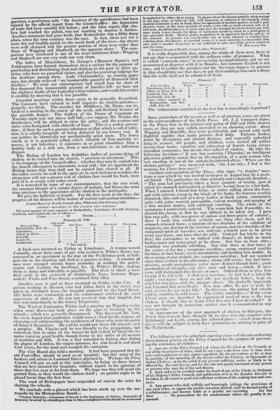Some particulars of the recent as well as of previous
cases, are given in the correspondence of the Daily Press. Dr. J. J. Conquest states, in the Times, that in the autumn and spring of 1827 and 1830, cholera cases, as they are now called, prevailed to an alarming extent : about Wrippino.' and Ratcliffe, they were pestilential, and spread with such frightful rapidity that many persons died daily. Patients broken down by dissipation and mental .distress, and especially enfeebled lying-in women, old people, and children, were carried off within twenty-four hours, vomiting and reIaxatimi of 'bowels being always attendant symptoms; but no one then talked of cholera. He adds the following anecdote—" It was but yesterday [ Thursday] an intelligent physician publicly stated, that on his hiquiring of a poor woman who WS standing in one of the said-to-be-infected Where are the cholera patients ? ' was answered with, Sir, I am one; I had it this morning, but I have been cured ! ' " Another correspondent of the Times, who signs "a Guyite," men- tions a case which he was invited to inspect in August last, by a medi- cal friend. The particulars are thus minutely and technically detailed- " The man had previously taken a large quantity of brandy, pait Of which his stomach had retained, as likewise tuning been in a hot bath. - When I entered, I found him lying, or rather rolling about the floor, and with extreme cramp in the whole of his limbs, his features terribly distorted; skin cold and Of a deep leaden or black colour, extremities 'quite cold, pulse scarcely perceptible, violent straining, and purging of a thin mucous matter, and continual vomiting. The whole of the symptoms I particularly noticed. 'The Warm bath had, if possible, in- creased the cramp, so that he was obliged to be taken out. I gave him two pills, with two grains of opium and three grains of _calomel ; these I made hint swallow without aims- thing after them, and his stomach retained them ; a mixture of two -drachms of the sulphate of magnesia,, one drachm of the tincture of opium, and two drachms of the compound spirit of lavender, was ordered; a fourth part to be given every two hours, one hour after the pills. Ordered hot bricks to his feet ; his extremities to be rubbed with flannel ; to drink as much barley-water and water-gruel as be chose. Saw him an hour after ; vomiting was gradually subsiding. Saw him three or four times in the course of the day ; symptoms mending; cramp continued terrible for three or four hours, never intermitting; and bending him double. In the evening at nine o'clock, the symptoms subsiding; had not vomited since three o'clock in the afternoon ; cramp still severe, but had inter- mission ; gentle perspiration, pulse more distinct though faint ; great prostration- of strength,—the eyes sunk and heavy,—which,- if once seen, will distinguish this disease at once. Ordered them to give him brandy if he felt cold. Called next morning.; lie bad had a tolerable night ;. two hours' sleep on awl off; was decidedly better; kept on gruel for two days, with the Mixture above, lie gradually improved, and I treated him accordingly. Ten days after, he was as well, he said, as ever lie was in his life." In this case, the patient had caught cold Ity standing in cold water. The writer concludes—" If the cases I have seen, are described by experieneed medical men as tin' true cholem, I should like to know what that WitS I have described ? It was not brought by contagion, neither was it communicated to any other persmi." Ta consequence of the near approach of cholera to Glasgow, the Dutch Government have thought fit to class that city, together with Edinburgh and Leith, ..among_the infected places vessels from these places will- he subject to forty days' quarantine on arriving in ports of the Netherlands.


























 Previous page
Previous page